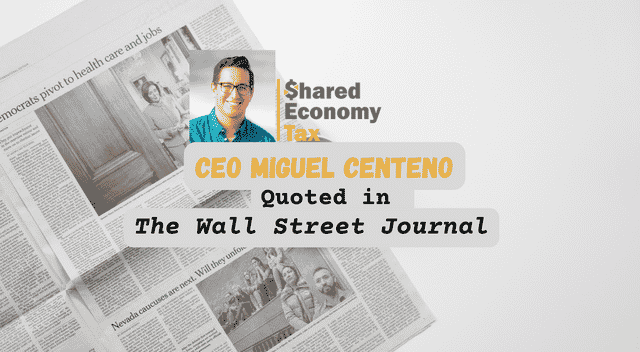Certain parts of the American Rescue Plan passed by Congress in 2021 carry major consequences for freelancers and independent contractors. The Wall Street Journal sought out Shared Economy Tax CEO Miguel Centeno’s expertise for an article on the subject.
Shared Economy Tax CEO Miguel Alexander Centeno
Miguel Alexander Centeno, CEO and Managing Partner of Shared Economy Tax, is a seasoned tax professional with Big Four accounting firm experience. Miguel eventually left PricewaterhouseCoopers to break out on his own, and he established Shared Economy Tax shortly after.
Shared Economy Tax was built from the ground up to serve the needs of Airbnb hosts and other sharing economy entrepreneurs. Our firm offers clients a one-stop shop for accounting and bookkeeping services, including long-term tax strategy guidance, and more.
In addition to the WSJ, cable news outlets like MSNBC and Fox Business have solicited Miguel’s wisdom. He has likewise testified before a congressional committee. Miguel also leads business-oriented mastermind groups and coaches soccer for his kids’ teams. He’s also an avid outdoorsman with a deep appreciation for nature and wildlife.
Wall Street Journal Quote
The Journal‘s article examined a provision of the American Rescue Plan that was widely overlooked when the legislation was enacted.
Prior to the bill’s passing, 1099-K tax forms only went to taxpayers with sales totaling more than $20,000 and more than 200 transactions.
However, that all changed with the passing of the American Rescue plan. Congress dropped the revenue threshold to just $600, so the IRS could have an easier job pinpointing untaxed income. The IRS also receives a copy of every 1099-K Form sent to a vendor, so the lower threshold will give the agency more opportunities to enforce compliance.
Centeno told the WSJ that the vast majority of his clients are more than willing to pay what they owe in income tax. However, gig workers and vendors who under-reported their income could be in for a rude awakening.
Shared Economy Tax requires clients to report all taxable income, so the change should be easy for them. But, contractors who are used to underreporting should expect larger tax bills in the years ahead.
Miguel also emphasized the very different circumstances of self-employed enterprises.
For example, an eBay seller might receive payment for an item, but, if the original purchase price and depreciation are accounted for, the sale could represent a net loss. As you can see, Form 1099-K might not reflect the actual business circumstances of the income.
Congratulations, Miguel!
In brief, Miguel told WSJ that honest and attentive vendors shouldn’t panic. However, taxpayers who under-report – which we DON’T recommend – will find it more difficult to do so in the future.
We’re extremely proud of our fearless leader for his WSJ quote! Our hard-working CEO definitely deserves the recognition. Thanks, Miguel! We can’t wait to read your next featured quote.
